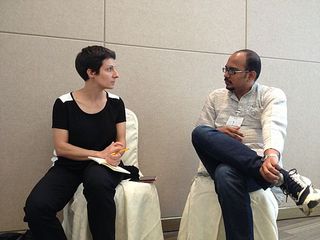Relationships
The Professional Conference: The Ultimate Networking Event
How to make the most of a convention or trade show
Posted January 17, 2016

In a career counseling session yesterday, a client asked me how to make the most of a professional conference. Here are my thoughts.
The exhibit area is a conference’s best and most underutilized networking opportunity. Before going to the conference, the conference website usually lists the exhibitors. Do a bit of research on each exhibitor you think you might want to work for. Then at the conference, during session blocks, the exhibit areas tend to be relatively empty, so that’s a good time to visit unless there’s a workshop you think is a better use of your time.
Before going to a target employer’s booth, review the notes you took on your research. Then go to the booth and look at some of their material and at the right moment, go to someone there who seems substantive and give your pitch: that your job is ending, the sort of work you’d do a good job at, and that you’re wondering if s/he had any advice for you. Ask for a job, you’ll get advice; ask for advice, you’ll more likely get a job because the person doesn’t feel pressured and besides, people like being asked for advice.
If you decide to attend a session, show up five or ten minutes before and look for a person who looks substantive and nice, perhaps wearing a badge saying s/he works for an organization you might want to work for. If you can muster the courage, approach the person and say something like, “Hi. I’m Joe Jones. This is my first time at the conference. How about you?” or some such---even about the room, food, or weather. Such small talk may seem silly but it's a social norm that lets a person know you've picked them out for conversation. If the conversation goes well, ask if s/he’d like to sit together. That offers an opportunity for little asides. Also, there’s something about physically being proximate. If you don’t meet such a person before the session begins, use your intuition to sit next to someone you sense might be helpful—or is cute. Or sit in the back so you can escape if the session is bad.
Many speakers have the power to hire you or are well-connected. One way to get quality time with them is to wait to be the last person to talk with them after their session and offer to walk with them to where they’re going next.
Also, at a conference, you’re often in a line: for breakfast, at the wine and cheese thing, whatever. Don’t just get in line at random. If the person at the end of the line doesn't feel promising, wait a few seconds to see if someone better gets in line. If you hit it off, ask if s/he’d like to have breakfast with you, a drink, dinner later, whatever.
And if, later, you meet other people whom you’d like to connect with, ask if s/he'd like to join the two of you for that drink, dinner, whatever.
Most conferences have optional recreational activities, especially in the evening: Some show, night tour of the city, whatever. That can be a networking opportunity---Again, on the tour bus, be strategic about who you sit next to, on the walking tour, who you walk near.
Speaking of transportation, sometimes the hotel’s airport shuttle can be a networking opportunity. The plane, going back or going there may be even better---You have hours cooped up. For example, I recall going to a conference and as I was walking down the aisle to the bathroom, I saw a passenger looking at the conference program. I stopped, told him I too was returning from the conference and we ended up sitting together for an hour.
Whatever way you meet someone at a conference, a plane, whatever, right after, take notes on the person on the back of their business card or elsewhere and then, if it feels right, send them a note, perhaps a thank-you or a link to an article that might interest them, etc., anything to keep building the relationship.
Many people go to conferences and come away with little more than a pile of handouts. These techniques can create rewarding relationships.
Marty Nemko's bio is in Wikipedia. His new book, his 8th, is The Best of Marty Nemko.


